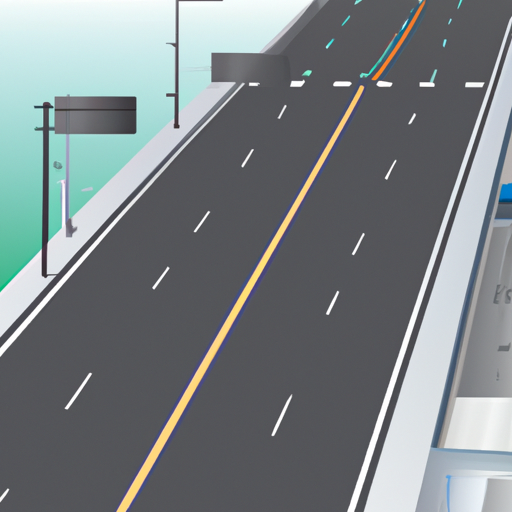With so much misinformation swirling around, it's time we set the record straight about road cleaning. This guide aims to debunk common myths about road cleaning, separating fact from fiction and giving you a clear understanding of what truly goes on in maintaining our highways and byways.
"Clean Roads Aren't Always Safe Roads": Is it True?
Many people believe that clean roads automatically equate to safe roads. However, this common misconception is far from the truth. While it's true that clean roads can improve visibility and reduce the risk of debris causing accidents, there are other factors at play that determine road safety.
Firstly, the condition of the road surface plays a crucial role in ensuring safety. Even if a road is impeccably clean, if it's riddled with potholes or cracks, it can still pose a hazard to drivers. These imperfections can cause tires to lose traction, leading to skidding and loss of control. Therefore, regular maintenance and repair of road surfaces are essential for ensuring safe driving conditions.
Secondly, clean roads alone cannot eliminate the risk of reckless driving or human error. Even on spotless roads, drivers who are under the influence of alcohol or drugs, or those who are distracted by their phones, can still pose a significant danger to themselves and others. It's important to remember that road safety is a shared responsibility, and all road users must adhere to traffic laws and exercise caution.
Additionally, weather conditions can greatly impact road safety, regardless of how clean the roads are. Rain, snow, or ice can make even the cleanest roads treacherous. Wet surfaces reduce tire grip, making it more difficult to stop or maneuver safely. It's crucial for drivers to adjust their speed and driving habits accordingly when faced with adverse weather conditions.
A photo of a seemingly clean road with hidden hazards
Does Rain Really Clean Roads? Unraveling the Truth
Rain has long been associated with the idea of cleaning, but when it comes to roads, does rain actually have the power to wash away dirt and grime? The truth may surprise you.
While rain does have some cleansing effects, it is not a magical solution that instantly cleans roads. In reality, rainwater can mix with the dirt and debris on the road, forming a slurry that can make the road even more slippery and dangerous. This can be particularly dangerous during the initial stages of rainfall when the water has not yet washed away the accumulated oil and grease on the road surface.
Moreover, rain can also reveal hidden dangers on the road. Oil and other substances that have accumulated on the road over time can rise to the surface when it rains, creating slick spots that can compromise traction and increase the risk of accidents. This phenomenon, known as "hydroplaning," occurs when a layer of water builds up between the tires and the road surface, causing the vehicle to lose contact with the road.
While rainwater can help remove loose debris and dust from the surface of the road, it is not a substitute for regular road maintenance and cleaning. Sweeping and other road cleaning methods are still necessary to ensure that the road remains safe and free from hazards. So, while rain can have some cleansing effects, it is important to remember that it is not the ultimate solution for keeping roads clean and safe. A comprehensive approach that includes regular maintenance, cleaning, and adherence to traffic laws is essential for road safety.
The Myth of 'The Cleaner, The Better': What's the Real Score?
The idea that cleaner roads are always better may seem intuitive, but is it really true? Let's examine this popular belief and uncover the truth behind it.
- 1. The Fallacy of Perfection:
Many people assume that a perfectly clean road is the key to safety and efficiency. However, striving for absolute cleanliness can be impractical and even counterproductive. While it is important to remove debris and hazards from the road, an excessively clean road can actually reduce traction, especially in wet conditions. A certain level of grip is necessary for vehicles to maintain control, and an overly clean road can be slick and slippery, compromising safety. - 2. The Role of Road Texture:
Road texture plays a vital role in maintaining traction and preventing accidents. A completely smooth road surface may seem desirable, but it can actually increase the risk of hydroplaning and reduce braking efficiency. A certain level of roughness in the road texture helps tires grip the surface, allowing for better control and shorter stopping distances. Therefore, a moderately clean road that retains some texture can be safer than an excessively clean one. - 3. Environmental Considerations:
Excessive road cleaning can also have negative environmental impacts. Many cleaning methods involve the use of water and chemicals, which can be wasteful and harmful to the ecosystem. Furthermore, constant cleaning can disrupt the natural balance of microorganisms that live on the road surface, which play a role in breaking down pollutants. Striking a balance between cleanliness and environmental sustainability is crucial for maintaining a healthy and functional road system.
An image depicting a highly cleaned road with potential drawbacks
Road Cleaning Myths Debunked: Separating Fact from Fiction:
| Myth | Fact | Myth | Fact |
|---|---|---|---|
| Road cleaning is too expensive | Proper road cleaning is cost-effective and can save money in the long run | Road cleaning can damage the environment | When done properly, road cleaning can actually improve the environment by reducing air and water pollution |
| Road cleaning is a waste of time | Regular road cleaning helps to keep roads safe and in good condition | Road cleaning is a luxury | Road cleaning is a necessity for safe and efficient transportation |
| Road cleaning is only done in cities | Road cleaning is essential for all roads, including rural roads | Road cleaning is a one-time job | Road cleaning should be done on a regular basis to maintain road safety and condition |
| Road cleaning is only done by manual labor | There are a variety of machines and tools that can be used to help with road cleaning | Road cleaning is only done at night | Road cleaning can be done at any time of day depending on the task that needs to be completed |
There's a lot more to road cleaning than meets the eye. It's not just about keeping our roads looking good – it's about safety, efficiency, and sustainability. By debunking these myths, we hope to foster a better understanding and appreciation for this essential service.



